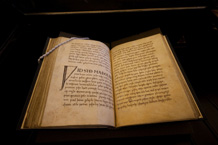Exeter Book facts for kids
The Exeter Book, Exeter Cathedral Library MS 3501, also known as the Codex Exoniensis, is a tenth-century book or codex which is an anthology of Anglo-Saxon poetry. It is one of the four major Anglo-Saxon literature codices, along with the Vercelli Book, Nowell Codex and the Cædmon manuscript or MS Junius 11. The book was donated to the library of Exeter Cathedral by Leofric, the first bishop of Exeter, in 1072. It is believed originally to have contained 131 leaves, of which the first 8 have been replaced with other leaves; the original first 8 pages are lost. The Exeter Book is the largest known collection of Old English literature still in existence.
In 2016, UNESCO recognized the book as one of the "world's principal cultural artifacts".
Contents
Contents
- Christ I, II, III
- Guthlac A and B
- Azarias
- The Phoenix
- Juliana
- The Wanderer
- The Gifts of Men
- Precepts
- The Seafarer
- Vainglory
- Widsith
- The Fortunes of Men
- Maxims I
- The Order of the World
- The Rhyming Poem
- The Panther
- The Whale
- The Partridge
- Soul and Body II
- Deor
- Wulf and Eadwacer
- Riddles 1-59
- The Wife's Lament
- The Judgment Day I
- Resignation
- The Descent into Hell
- Alms-Giving
- Pharaoh
- The Lord’s Prayer I
- Homiletic Fragment II
- Riddle 30b
- Riddle 60
- The Husband's Message
- The Ruin
- Riddles 61-95
Riddles
Among the other texts in the Exeter Book, there are over ninety riddles. They are written in the style of Anglo-Saxon poetry and range in topics from the religious to the mundane. Some of them are double entendres, such as Riddle 25 below.
Here are two of these Anglo-Saxon riddles, both in Old English and translated into modern English. The answers to the riddles are included below the text.
|
Ic eom wunderlicu wiht wifum on hyhte |
I am a wondrous creature for women in expectation, |
| —Riddle 25 (Marsden 2015) |
- Answer: an onion
|
Mec feonda sum feore besnyþede, |
Some fiend robbed me from life, |
| —Riddle 26 (Marsden 2015) |
- Answer: Bible
Elegies
The Exeter Book contains the Old English poems known as the 'Elegies': The Wanderer (fol. 76b - fol. 78a); The Seafarer (fol. 81b - fol. 83a); The Riming Poem fol. 94a - fol. 95b); Deor (fol. 100a - fol. 100b), Wulf and Eadwacer (fol. 100b - fol. 101a); The Wife's Lament (fol. 115a - fol. 115b); The Husband's Message (fol. 123a - 123b); and The Ruin (fol. 123b - fol. 124b). The term "elegy" can be confusing due to the diverse definitions from different cultures and times. For example, the Oxford English Dictionary states: "In Greek and Latin literature elegiac metre was used for poetry expressing personal sentiments on a range of subjects, including epigrams, laments, sympotic poetry, and (in Rome) love poetry. " In Victorian literature, an elegy is generally a poem written for the dead and although the naming of these poems as 'elegiac' was a Victorian invention, it can be a useful term. As Anne Klinck in her book 'The Old English Elegies' writes: 'genre should be conceived, we think, as a grouping of literary works based, theoretically, upon both outer form (specific meter or structure) and also upon inner form (attitude, tone, purpose — more crudely, subject and audience)'. In regards to the Exeter Book Elegies, this term can be widened to include "any serious meditative poem. " The poems included in the Exeter book share common themes of longing, loneliness, pain, and the passage of time.
Editions and translations
Included here are facsimiles, editions, and translations that include a significant proportion of texts from the Exeter Book.
Facsimiles
Editions: Old English text only
Editions: Old English text and translation
Anthology of Old English poetry, featuring many of the texts from the Exeter Book.
Editions: Translations only
Anthology of Old English poetry and prose, featuring poems from the Exeter Book.
Contains riddles only.
- Williamson, Craig, (2017) The Complete Old English Poems. University of Pennsylvania Press. .
See also
 In Spanish: Libro de Exeter para niños
In Spanish: Libro de Exeter para niños


